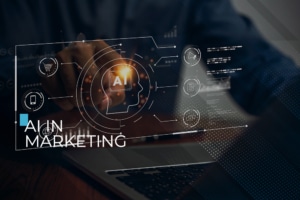Leveraging AI in Marketing for Business Success
Marketing 2.0: AI Is Redefining Business Growth for Wisconsin Companies
Years in Business
Completed Projects
AI in marketing revolutionizes how businesses connect with customers, delivering measurable results that traditional approaches cannot match. Companies leveraging artificial intelligence in their marketing strategies report 40% higher conversion rates and 30% lower customer acquisition costs according to recent industry research.
This technology transformation presents unprecedented opportunities for startups and mid-sized B2B firms in Southeast Wisconsin to compete effectively against larger competitors while maximizing their marketing investments.
The competitive landscape in Wisconsin’s business market demands innovative approaches to customer engagement and lead generation. Traditional marketing methods struggle to keep pace with evolving consumer expectations and the need for personalized experiences at scale.
Milwaukee Web Design recognizes that businesses must embrace intelligent automation to thrive in today’s digital economy while maintaining authentic connections with their target audiences.

The technology enables businesses to deliver the right message to the right person at the optimal time through automated decision-making processes. Modern AI platforms integrate seamlessly with existing marketing tools while providing actionable insights that drive strategic business decisions.
Data from Salesforce indicates that 84% of customers expect companies to treat them as individuals rather than numbers in a database. AI marketing addresses this expectation by creating personalized experiences for each prospect and customer throughout their buying journey.
The technology identifies patterns in customer behavior that human marketers might miss, revealing opportunities for improved engagement and conversion optimization. Milwaukee marketing automation becomes more effective when businesses understand these fundamental principles and apply them strategically.
Predictive analytics platforms represent the cornerstone of effective AI marketing implementation, enabling businesses to forecast customer lifetime value and identify high-probability prospects before competitors recognize the opportunity. These tools analyze historical data patterns to predict future customer actions with remarkable accuracy, typically achieving 75-85% precision rates in lead scoring applications.
Email automation powered by artificial intelligence personalizes subject lines, content recommendations, and send times based on individual recipient preferences and engagement patterns. Chatbots equipped with natural language processing capabilities handle customer inquiries 24/7 while collecting valuable data about customer needs and pain points.
Content optimization algorithms analyze thousands of variables to determine which headlines, images, and calls-to-action generate the highest engagement rates for specific audience segments. These systems continuously test different variations and automatically implement the best-performing options without manual intervention.
Social media management platforms use AI to identify optimal posting times, trending topics, and engagement opportunities that align with brand messaging and business objectives. The integration of these tools creates a comprehensive marketing ecosystem that operates efficiently while delivering measurable business results for Wisconsin companies seeking sustainable growth.
Successful AI marketing deployment requires a structured approach that begins with clearly defined business objectives and key performance indicators that align with company growth targets. Organizations must audit their existing data sources and marketing technology stack to identify integration opportunities and potential obstacles before implementing new AI solutions.
The most effective strategies start with one or two specific use cases rather than attempting comprehensive transformation simultaneously, allowing teams to learn and adapt while building confidence in the technology.
Wisconsin businesses benefit from partnering with experienced professionals who understand both AI technology capabilities and local market dynamics that influence customer behavior patterns. Professional SEO services integrate AI tools to improve search rankings while maintaining focus on user experience and conversion optimization.
The implementation timeline typically spans 3-6 months for complete optimization as AI systems require sufficient data to make accurate predictions and recommendations. Companies investing in comprehensive AI marketing strategies report average revenue increases of 15-25% within the first year of implementation.
Data quality issues represent the primary obstacle preventing successful AI marketing implementation, as algorithms require clean, consistent information to generate accurate insights and recommendations.
Many businesses struggle with fragmented customer data across multiple platforms including CRM systems, email marketing tools, social media platforms, and website analytics that do not communicate effectively with each other. Staff training and change management present additional challenges as team members must adapt to new workflows and learn to interpret AI-generated recommendations while maintaining strategic oversight of marketing campaigns.
Southeast Wisconsin companies often face budget constraints when evaluating AI marketing solutions, leading to concerns about return on investment and implementation costs that may seem prohibitive for smaller organizations. However, research from McKinsey demonstrates that businesses delaying AI adoption fall behind competitors at an accelerating rate, with market share losses becoming increasingly difficult to recover.
Milwaukee AI marketing specialists help businesses navigate these challenges through phased implementation approaches that minimize risk while maximizing learning opportunities and early wins.
Key performance indicators for AI marketing campaigns extend beyond traditional metrics to include predictive accuracy rates, customer lifetime value improvements, and automation efficiency gains that demonstrate the technology’s impact on business operations. Advanced attribution modeling reveals how AI-driven touchpoints contribute to conversions throughout complex buyer journeys that span multiple channels and extended timeframes. Regular performance reviews should examine both quantitative results and qualitative feedback from sales teams and customers to ensure AI recommendations align with business objectives and market realities.

Companies achieving the highest ROI from AI marketing investments typically review performance data weekly and make strategic adjustments monthly while maintaining long-term focus on customer relationship building and brand development. The most successful implementations balance automated efficiency with human creativity and strategic thinking that maintains authentic brand voice and customer connections.
Emerging AI technologies including generative content creation, advanced predictive modeling, and real-time personalization engines will reshape marketing landscapes over the next three years as adoption rates accelerate across industries.
Forward-thinking businesses must evaluate their current technology infrastructure and team capabilities to ensure readiness for these developments while maintaining focus on fundamental marketing principles that drive customer acquisition and retention. The integration of AI with emerging platforms and communication channels requires strategic planning that balances innovation with proven marketing methodologies.
Wisconsin’s economic climate presents unique opportunities for businesses that embrace AI marketing early, as the state’s diverse industry base creates multiple niche markets where personalized approaches deliver competitive advantages. Only 23% of businesses currently use AI marketing effectively, creating significant opportunities for early adopters to capture market share before competitors recognize the technology’s potential.
Leading industry research indicates that companies implementing comprehensive AI marketing strategies today will maintain competitive advantages for years as the technology becomes increasingly sophisticated and accessible to organizations of all sizes.
Studies show AI in marketing can increase conversion rates by up to 40% while reducing customer acquisition costs by 30%. The technology enables precise audience targeting and personalized messaging that resonates with specific buyer personas.
Wisconsin startups benefit most from AI-powered email automation, predictive analytics for lead scoring, and chatbots for customer service. These tools provide immediate ROI while building scalable marketing foundations.
Most businesses see initial improvements within 30-60 days of implementing AI marketing tools. Full optimization typically occurs within 3-6 months as the AI systems learn from customer data and behavior patterns.
Yes, AI marketing delivers strong ROI for mid-sized B2B companies. The average business sees a 300% return on AI marketing investments within the first year through improved lead quality and automated processes.
The main challenges include data integration across multiple platforms, staff training on new technologies, and choosing the right AI tools for specific business needs. Working with experienced marketing professionals helps overcome these obstacles.
Web services are more than just website creation. They involve strategically crafting an experience that engages users, builds credibility, and turns your target audience into loyal customers.
Marketing goes beyond promoting products—it’s about telling a powerful brand story that builds trust, nurtures community, and drives meaningful business growth.
Book your no-obligation strategy session today and receive a complimentary custom homepage design. Limited to just 5 spots per month—reserve yours before they’re gone.

